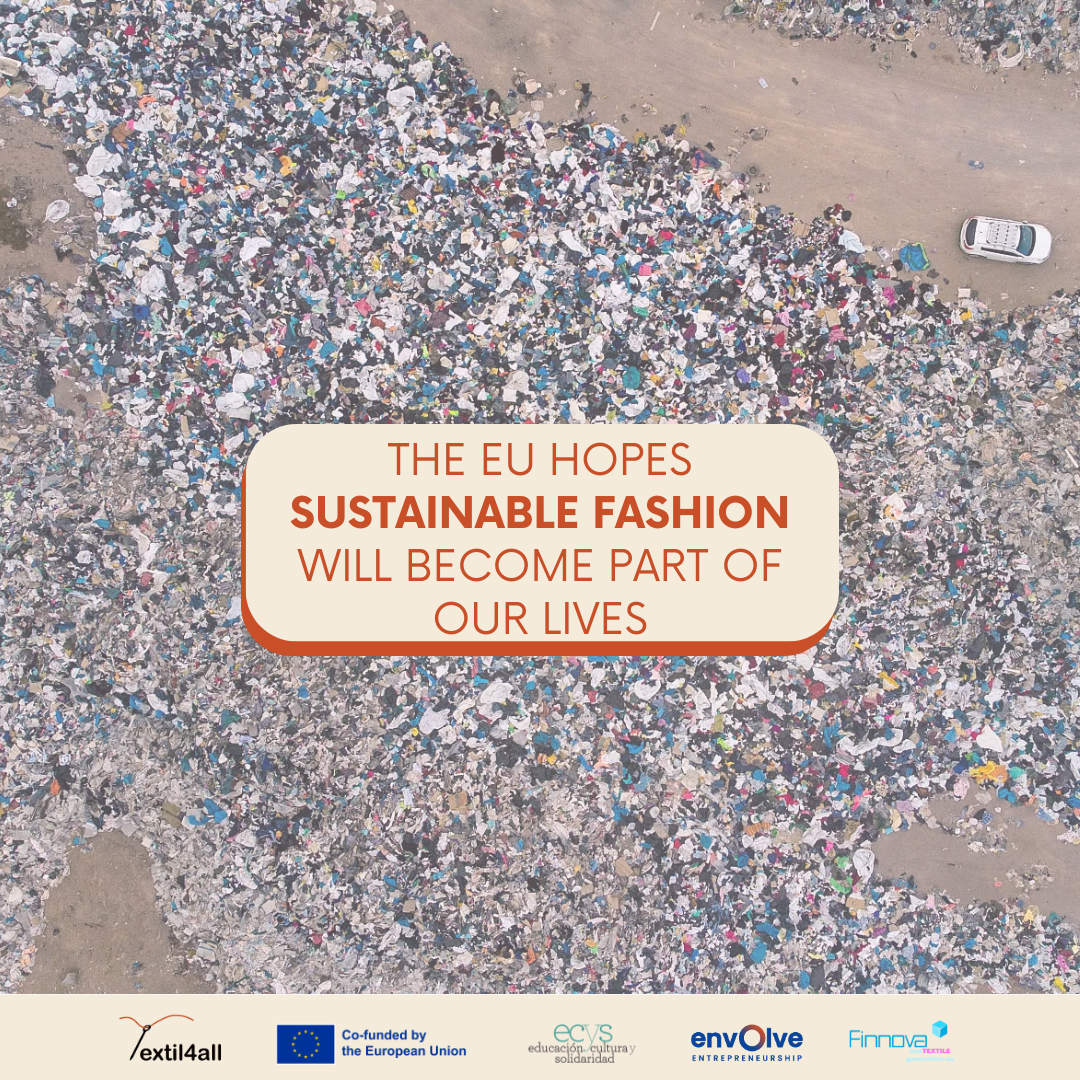- The EU is confident that this harmful pattern of clothing consumption will soon be a thing of the past.
- “People and the planet are more important than the textile industry’s profits.”
As we have mentioned several times before, the fashion industry is considered one of the most polluting industries in the world, responsible for about 20% of the planet’s wastewater. The EU is aware of this situation and intends to change it, but is it possible? Could fast fashion finally be losing steam? The European Union thinks so, as does the European project Textil4All, which aims to promote a more sustainable textile industry committed to today´s environmental challenges.
“We are living through a climate emergency, when deep change needs to happen fast. Sustainability strategies, commitments and slogans are rightly being challenged to understand the real action occurring,” says Amina Razvi, executive director of global non-profit Sustainable Apparel Coalition.
According to an article published by Euronews (https://es.euronews.com/cultura/2023/08/07/el-fin-de-la-moda-rapida-la-ue-confia-en-que-asi-sea), while many consumers, encouraged by the “woke” Generation Z, say they want to be more sustainable in their choice of clothing, the EU is looking into helping to make this happen.
However, the EU is confident that this harmful pattern of clothing consumption will soon be a thing of the past.
The parliament states consumers should have more information to make sustainable choices and calls for a ban on the destruction of unsold and returned textile goods in the upcoming revision of the ecodesign regulation. MEPs want clear rules to stop greenwashing by producers, through for example the ongoing legislative work related to empowering consumers in the green transition and regulating green claims.
In addition to this, last month the European Parliament adopted recommendations, including policies to make clothing more durable, repairable and recyclable. As Delara Burkhardt MEP stated: “The EU must legally oblige manufacturers and large fashion companies to operate in a more sustainable way.”
Places like the Atacama Desert (Chile) and African countries such as Ghana and Kenya currently bear most of the world’s textile waste.
Places as Ghana and Kenya and The Atacama Desert has earned the undesirable title of “garbage dump of the world” after it became known that this area is home to some 741 hectares of abandoned clothing. That is equivalent to an area as large as Central Park (background image).
The EU hopes to move from a linear to a circular model, where every garment can be reused, recycled or, at the very least, made biodegradable and compostable. To tackle transparency, the EU will introduce a digital product passport for textiles that follow mandatory requirements on circularity and environmental sustainability.
“People and the planet are more important than the textile industry’s profits.” said Delara Burkhardt MEP and pointed out that “The real way to tackle the problem of fast fashion is to educate customers and show them that there are other ways to relate to fashion.”
While the EU’s proposals are going in the right direction, they are clearly not enough to put a definitive end to fast fashion.
Ideally, consumers would like to distance themselves from the sector and make more sensible choices, but the current economic situation remains a real challenge for many.
Together, let’s revolutionize the fashion industry for a greener, more conscious, and more sustainable future.
Join us in this mission to make the textile sector an engine for positive change!
Textil4all “Opportunities in the textile sector for people and the planet” was funded by SEPIE-Spanish Service for the Internationalization of Education through the Erasmus+ program. With a budget of 60,000 euros and a duration of 19 months, the initiative aims to offer training and job opportunities to people with more difficulties in accessing a job, with a special focus on women.in San Cristobal de los Angeles in Madrid (Spain) and Thessaloniki (Greece). Led by Educación, Cultura y Solidaridad (Spain), the project counts with Envolve (Greece) and Finnova Foundation (Belgium) as partners.
About Educación Cultura y Solidaridad (ECyS)
Educación Cultura y Solidaridad is a non-profit association whose mission is to promote the integral development of people so that they can be protagonists of their own history and collaborate in the construction of social problems, promoting participation and local development for a fairer world and an inclusive society. To this end, it carries out actions of socio-educational intervention with people and groups with greater difficulty of inclusion, promoting their empowerment. The Centre is consolidated and recognised in San Cristóbal de los Ángeles (Madrid) as a point of reference for families, children and young people from different backgrounds and young people at risk of exclusion, to whom it offers the possibility of socio-professional and academic training.
About ENVOLVE
Envolve is a global organisation that supports entrepreneurship and innovation. Envolve Greece is part of Libra Social Responsibility, with initiatives offering educational and entrepreneurial opportunities, including support for RSL’s activities in response to the refugee crisis. Envolve is a member of the Ecosystex network (part of the European Technology Platform for the Future of Textiles and Clothing) and offers programmes that support entrepreneurship and sustainable enterprises.
About Finnova
The Finnova Foundation is a Spanish-Belgian non-profit organisation created in 2009 with the aim of promoting innovation both regionally and locally across Europe, and internationally through partner countries. Finnova focuses especially on innovation in the fields of new technologies or business models related to environmental sustainability and social inclusion.

